Pavel Grinfeld - Hello Again, Linear Algebra: A Second Look At The Subject Through A Collection Of Exercises And Solutions
Here you can read online Pavel Grinfeld - Hello Again, Linear Algebra: A Second Look At The Subject Through A Collection Of Exercises And Solutions full text of the book (entire story) in english for free. Download pdf and epub, get meaning, cover and reviews about this ebook. year: 2014, publisher: Insightful Texts, genre: Children. Description of the work, (preface) as well as reviews are available. Best literature library LitArk.com created for fans of good reading and offers a wide selection of genres:
Romance novel
Science fiction
Adventure
Detective
Science
History
Home and family
Prose
Art
Politics
Computer
Non-fiction
Religion
Business
Children
Humor
Choose a favorite category and find really read worthwhile books. Enjoy immersion in the world of imagination, feel the emotions of the characters or learn something new for yourself, make an fascinating discovery.

- Book:Hello Again, Linear Algebra: A Second Look At The Subject Through A Collection Of Exercises And Solutions
- Author:
- Publisher:Insightful Texts
- Genre:
- Year:2014
- Rating:5 / 5
- Favourites:Add to favourites
- Your mark:
Hello Again, Linear Algebra: A Second Look At The Subject Through A Collection Of Exercises And Solutions: summary, description and annotation
We offer to read an annotation, description, summary or preface (depends on what the author of the book "Hello Again, Linear Algebra: A Second Look At The Subject Through A Collection Of Exercises And Solutions" wrote himself). If you haven't found the necessary information about the book — write in the comments, we will try to find it.
This book is for current linear algebra students looking to master the concepts of the subject, and for those who have taken it in the past looking for a refresher. Its an easy read which aims to illustrate concepts with examples and exercises.
Linear algebra is a grand subject. Because it is fundamentally different from any high school mathematics, and because of the wildly varying quality of instructors, not all students enjoy learning it. In either case, whether you loved it or hated it, it takes several passes to learn linear algebra to the point that it becomes one of your favorite tools, one of your favorite ways of thinking about practical problems.
This little textbook invites you on your second pass at linear algebra. Of course, your second pass may take place alongside your first pass. You may find this textbook particularly useful if you are studying for a test. Our goal is to take a step back from the mechanics of the subject with an eye towards gaining a larger view. A larger view, however, is achieved in small steps. We are not hoping for a big revelation but for a few small aha! moments. It simply takes time to put together the grand puzzle of linear algebra. You will get there, and the point, as the cliche goes, is to enjoy the ride.
Psychology in mathematics is everything. I chose the topics according to the impact I feel they would make on your relationship with linear algebra. The textbooks utmost goal is to make you feel positively about the subject. You will find that some topics are surprisingly simple, others surprisingly tough. Some topics have important applications, others have none at all. Some were well presented in your linear algebra course, others skipped altogether. However, I hope you will find that all topics bring you a little closer to the subject of linear algebra.
Pavel Grinfeld: author's other books
Who wrote Hello Again, Linear Algebra: A Second Look At The Subject Through A Collection Of Exercises And Solutions? Find out the surname, the name of the author of the book and a list of all author's works by series.

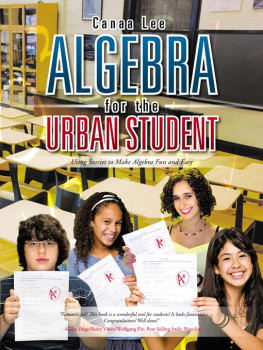

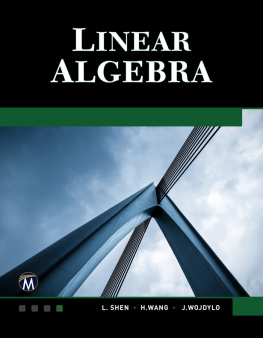
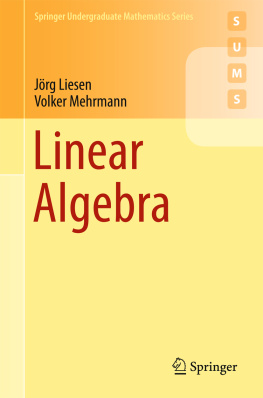
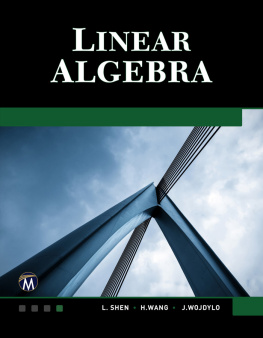
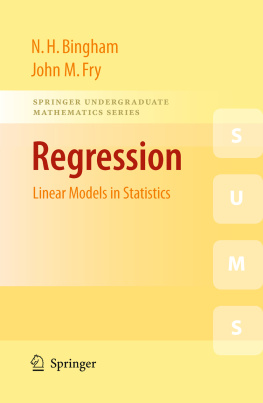
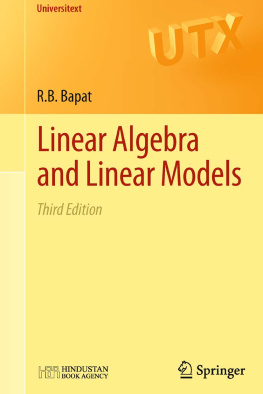

 , lets talk about entries, rather than lengths and angles. Sets of numbers have entries and nothing else. Sets of numbers don't have lengths and directions, and when they do eventually acquire these notions, it doesn't happen in the corrupted way presented in most textbooks. Finally, functions are functions, and polynomials are polynomials. There's no need to think of polynomials as "vectors" of coefficients. Polynomials are cool on their own terms. Other than adding them and multiplying them by scalars, you can differentiate them and even dilate them. Can you do that with "vectors" of coefficients?
, lets talk about entries, rather than lengths and angles. Sets of numbers have entries and nothing else. Sets of numbers don't have lengths and directions, and when they do eventually acquire these notions, it doesn't happen in the corrupted way presented in most textbooks. Finally, functions are functions, and polynomials are polynomials. There's no need to think of polynomials as "vectors" of coefficients. Polynomials are cool on their own terms. Other than adding them and multiplying them by scalars, you can differentiate them and even dilate them. Can you do that with "vectors" of coefficients? in the plane:
in the plane: 
 for the space of cubic polynomials:
for the space of cubic polynomials:
 in
in  :
: 